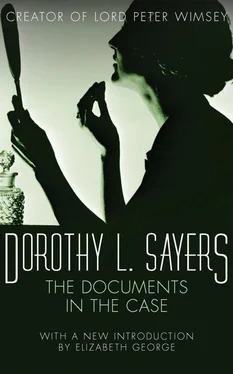When Lathom turned up at about one o’clock on the 19th, I explained this to him and apologised for having no lunch to offer him. Like most men, and women, too, when left to themselves, I found solitary meals uninspiring. So, apparently, did ‘the girl’, whom, till my wife left me, I had imagined to be a good cook. Not that I had ever expected Elizabeth to leave her writing to see after my meals, I can only suppose that her moral influence was enough to make the difference between roast mutton and raw.
Lathom commiserated with me, and we went and had some grub at the ‘Bon Bourgeois’. He seemed to be in high spirits, when he thought about it, but had a way of going off into fits of abstraction which suggested nerves or preoccupation of some kind. He asked about the anthology and my work generally with apparent interest, and then, to my surprise, broke suddenly into my description of the plot of my new novel by saying:
‘Look here, if the wife’s away, why don’t you come down to the Shack with me for the weekend? It’ll do you good, freshen you up and all that.’
‘Good heavens,’ I said, ‘it’s Harrison’s place. He won’t want me.’
‘Oh yes, he’d love to have you. Oh, rather. In fact, he only said to me, when I was starting off, he wished I could bring you back with me. He’s quite forgotten all that misunderstanding. He’s rather distressed about it, really. Thinks he did you an injustice. Would like to make it up. He says you must be harbouring resentment, because you’ve been in town all this time and haven’t been to see them.’
‘That’s nonsense,’ I said. ‘ You know why I’ve thought it best to keep out of it.’
‘Yes, but he doesn’t. Naturally he thinks you’re offended.’
‘Didn’t you tell him I was busy?’
‘Of course. Oh, yes. Played up the popular literary man for all it was worth. So he said, of course you were too important nowadays to remember your old friends.’
‘Damn it,’ I said, ‘what a tactless devil you are, Lathom. You needn’t have hurt his feelings.’
‘No, but look here. Why not come down? It’ll please the old boy no end, and as neither of the women will be there, there won’t be any awkwardness. It’s a damned good opportunity for being civil to him without involving your wife.’
‘Civil is a good word for it,’ I objected. ‘I don’t know that it’s particularly civil to plant myself on the man like that, and make him feed me and so on, without notice, when he probably doesn’t want me. Just at the weekend, too, when it’s difficult to get extra supplies.’
‘Oh, that doesn’t matter,’ said Lathom, ‘we’ll take some grub down with us. I was going to in any case. Everything has to be brought out there by a carrier twice a week. Frightful desolate hole. We’ll take a bit of beef and a couple of pounds of sausages. That’ll see us through all right.’
I considered it.
‘I say,’ said Lathom, suddenly. ‘Do come, old man. I wish you would. It’s all right there, you know, but I do get a bit bored at times. I’d like to have a yap with somebody who talks my language.’
‘If you’re fed up,’ I said reasonably, ‘why do you stay?’
‘Oh, well — I promised I would, don’t you see. It’s not bad really, but it would do us both good to have a bit of a change.’
‘Now, look here, Lathom,’ said I, ‘I don’t like the idea particularly. I’m not particularly puritan’ (I don’t know why one uses that phrase — I suppose it is easier to disown one’s decencies when one represents them as something grotesque in a black suit and steeple-hat), ‘but considering the way you behaved to Harrison, I think it’s rather thick to go and push your friends on to him. What you do is your own business’ (looking back on it, I seem to have extracted a great deal of satisfaction from this original thought), ‘but it’s rather different for me.’
‘Punk!’ said Lathom. ‘That’s all absolutely over. Finished. Washed out. It’s you who keep on digging it up again. Can’t you forget it and come down and help me out with old Harrison?’
‘Why so keen?’
‘Oh, I’m not particularly keen. I thought you’d like it, that’s all. It doesn’t matter. What are you doing this afternoon? B.M. again?’
I said, no; I avoided the Reading Room on Saturday afternoons, because it was so crowded, and asked him about his work.
He talked about it a little, in the same vague way as before, saying how difficult it was to settle to anything, and displaying some irritability with his sitters of the moment. His triumph at the Academy had made him fashionable, and fashionable women were all alike, it seemed; small-minded and featureless. One might as well paint masks. All of which I had heard so often from other painters that I put Lathom down as already spoilt.
I suggested that he should stay up in town and do a show with me, but he said he was fed up with shows. He had only come up to see his agent, and was catching the 4.30. Why didn’t I change my mind and come with him?
It ended in my changing my mind, and going. I hardly know why, except that I was only six mouths married and my wife was away, which, to the well-balanced mind, is no good reason for idle behaviour.
The express ran us down in smooth, stuffy comfort, and reached Newton Abbot dead on time at 9.15. I cannot say — though I have tried — that I remembered any particular incident on the way down. I hate talking on railway journeys, anyway, and Lathom did not seem very conversational. I read — it was Hughes’s High Wind in Jamaica — an overrated book, I think, considered as a whole, but memorable for that strange and convincing description of the earthquake. The thick heat and silence, and then the quick, noiseless shift of sea and shore, like the tilting of a saucer. Good, that. And the ghastly wind afterwards. And the child, not realising that anything out of the way had happened, because nobody gave the thing its proper terrifying name. That is very natural. I do not care for the part about the pirates. It is an anti-climax.
I know we dined on the train, but railway meals are seldom memorable. Lathom grumbled and left his portion half-eaten, and I said something about his acquiring a taste for hedgehog-broth and stewed toadstools — some silly remark which he took as a deadly insult.
At Newton Abbot we changed into the local, and dawdled through Teigngrace, Heathfield and Brimley Halt, taking over half an hour about it, till we were turned out, twenty minutes late, on the platform at Bovey Tracey. It was a quarter-past ten and dark, but the smell of the earth came up pleasantly, with a welcome suggestion of rain in the air. I stood on the platform, clutching an attaché case in one hand and the bag with the beef and sausages in the other, while Lathom transacted some occult business with a man outside. Then he came back, saying briefly, ‘I’ve got a man to take us,’ and we stumbled out to where an aged taxi thrummed mournfully in the gloom. Lathom bundled in, and I parked my bags at his feet.
‘What the devil’s that?’ he said crossly.
‘The grub, fathead,’ said I, following him in.
‘Oh, yes, of course, I’d forgotten,’ he said. ‘Come on, let’s get going, for God’s sake!’
Being used to Lathom, I ignored his irritability. We jolted off.
The taxi had a churchyard smell about it, and I mentioned the fact. Lathom slammed the window down with an impatient grunt. I remarked, foolishly, that he didn’t seem very enthusiastic about the trip. He said:
‘Oh, don’t talk so much.’
It seemed to me that the prospect of seeing Harrison again had rather got on his nerves, and I looked forward to an exasperating weekend.
‘ Vous l’avez voulu , Georges Dandin,’ I reflected, and lit a cigarette resignedly. The narrow road heaved and sank between dark hedges, but climbed on the whole, wriggling determinedly up and round to the ridge. A dim light or so and a cluster of black roofs announced civilisation, and Lathom roused himself to say: ‘Manaton — there’s a good view from here by daylight.’
Читать дальше












